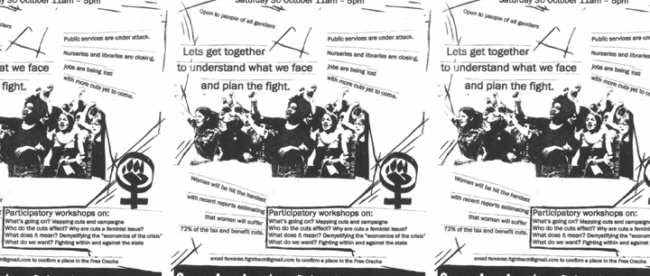Women at the Cutting Edge…Saturday 30th October 2010

On 20th October the ConDem government’s “Spending Review” will detail enormous cuts in public services. We are already feeling the impact of earlier cuts many effected by Labour; nurseries and libraries are closing, jobs are being lost. As the government “austerity drive” steps up, the reality is that cuts will hit the lives of all but the wealthiest. In many cases women will be hit the hardest with recent reports estimating that women will suffer 72% of the tax and benefit cuts.
Whether you’re a feminist, an activist, a trade unionist, someone affected by the cuts, or involved in fighting the cuts in your college, community or workplace, or just interested in how the landscape of the welfare state is changing, Feminist Figtback invites you to join a day of discussions and networking. We want to put these cuts in a political context, link up, and share ideas and skills as we plan to fight them together.
Women at the Cutting Edge
11am – 5pm, Saturday 30th October 2010
The Arbour, 100 Shandy Street, E1 4ST (nearest tube Stepney Green).
Free creche available. Open to people of all Genders.
For more information or to book a stall at the event or a place in the creche please email or call Laura on 07971 842027.
Who do the cuts affect? Why are cuts a feminist issue?
….Because the way cuts will impact on working-class women. For instance, job cuts will disproportionately affect women as we make up 65% of the public sector workforce (often in the lowest paid grades).….Because financial support and services for children will be seen as “extras”. Billions of pounds are being cut from child benefit, tax credits, maternity support, Sure Start and other Children’s Services.…And for many other reasons.
This workshop will start with an overview of government plans. This workshop will ask particpants to think about and discuss the myriad ways in which cuts affect women. We are affected as “frontline workers”. But also because we are patients, refugees and survivors of domestic abuse. What will “redundancy” mean for women? Part-time jobs at ever lower rates of pay? What happens to our lives when bosses scrap rights such as “flexible working”?Women from the RMT union who are fighting job cuts on London Underground will discuss with us what is at stake in their industrial dispute. They want to stop job cuts which could also worsen the inequalities they face in their working lives.All politicians like to talk hypocritically about making the cuts “fair”; they might even identify cuts that impact disproportionately on women as being unfair. But that does not mean, as is implied, that there should be more cuts for men, or different kinds of cuts! How do we criticise those arguments? What are our alternatives and how can we promote that alternative in the wider movement against the cuts?
Demystifying the “economics of the crisis…
This workshop to discuss economic explanations and analysis of the economic crisis and why these cuts are taking place. Many people feel alienated by the way the economy is discussed and feel ‘unqualified’ to participate in debates. We understand that the ‘economy’, ‘economic jargon’ and the ‘economic academia / debate’ are not neutral. That the fact a capitalist economy is not run in the interests of the working class relates to the over complicated jargon that is used in discussions and the elitism and mystery of ‘economics’ because the latter is not meant to be understood by the majority of people. The study of mainstream ‘economics’ as a science often over-complicates ‘the economy’ as something distinct and separate to people – machinery governed by objective rules. We often talk about ‘the’ economy not ‘our’ economy.
This workshop will also attempt to demystify economic jargon and provide an inclusive space – not one that divides in to the ‘experts’ teaching the ‘non experts’. We want bring the discussion of economic theory with the present and our personal experience. Therefore, we would like the workshop to also go right back to the basics and ask the question what is an economy?
In, Against (and Beyond?) the State’: What are our Strategies for Fighting Cuts?
How can we make sure the fight against cuts isn’t just about defending existing and often unsatisfactory public services, but becomes a struggle for a better way to organise our society and our lives? This workshop doesn’t pretend to have the answer to a question which we nevertheless believe is central to building an anti-cuts movement that will win. Instead we aim to provide a space in which together we can begin to find solutions and strategies. This workshop is for those of you think that the call to ‘defend public services’ isn’t enough, but are also repulsed by the perverted version of community autonomy advocated by Cameron’s Big Society, then we need you at this workshop. It is a workshop for public sector workers frustrated by lack of control or resources, and for service users sick of being short-changed and disempowered. It is for people who want to create alternative ways of educating, living together and supporting each other, but who want those alternatives to be available to everyone rather than just a middle-class elite. It is for anyone who wants to listen to and learn from each other to find political practices that will enable us to fight both within and against the system and in, against and beyond the state.
Suggest Reading (Pre-Workshop)
In and Against the State. London-Edinburgh Weekend Return Group. 1981
” Local Experience.” Segal, Lynne. in “Beyond the Fragments: Feminism and the Making of Socialism.” Rowbotham, Sheila, Wainwright, Hilary, and Segal, Lynne. 1979.
